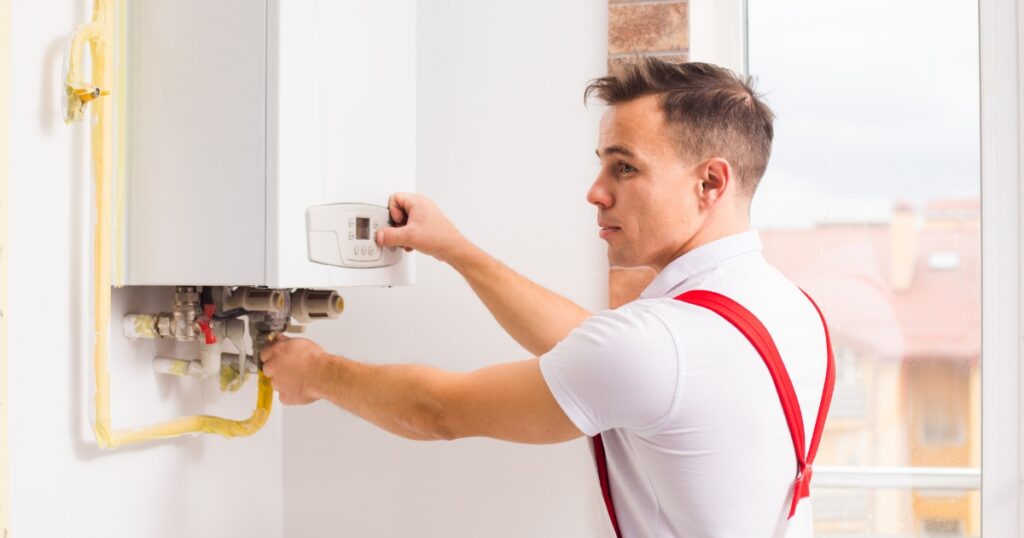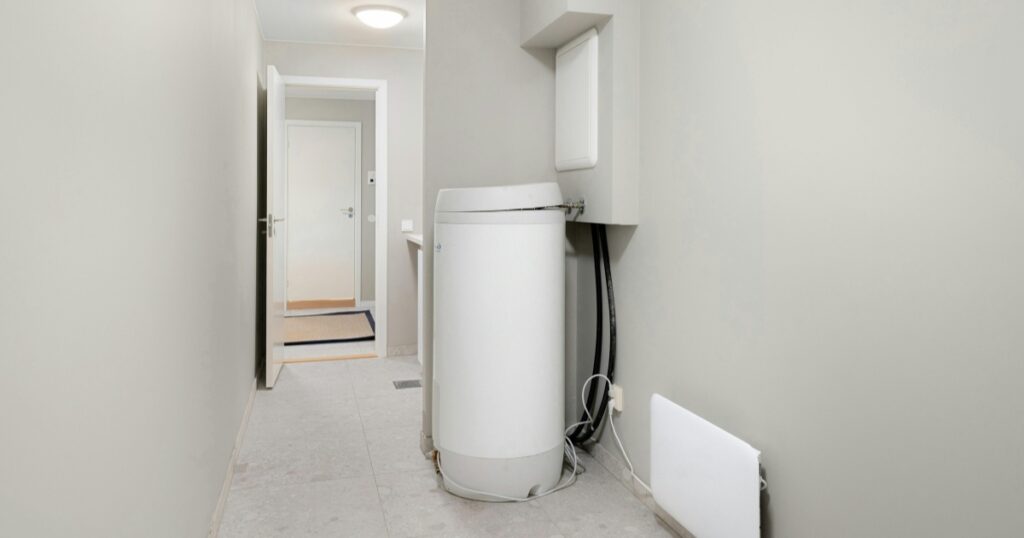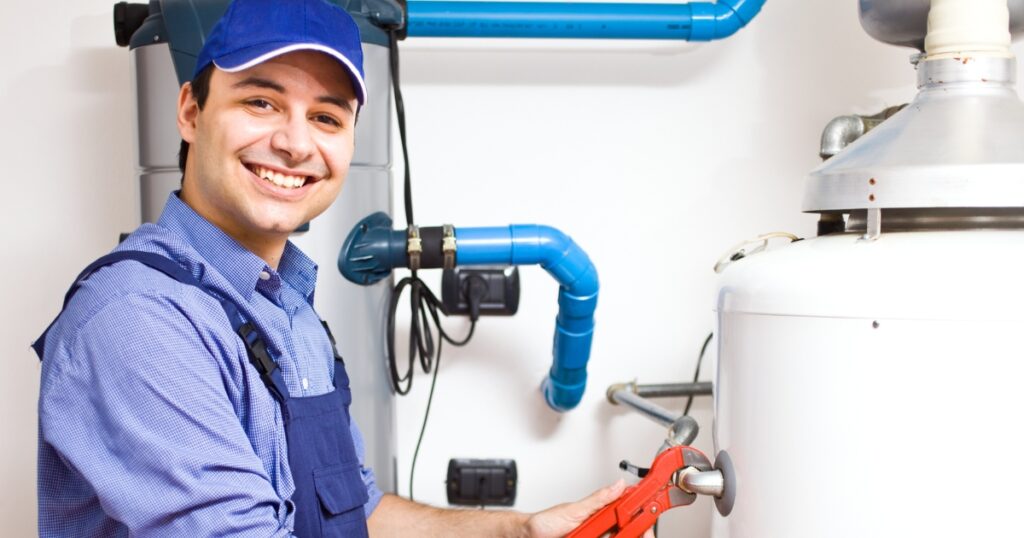Copping a blast of too-hot water from your taps is an all-too-familiar drama. Yep, we’ve copped it as well, realising that boiling water often points to an overheating hot water system going bonkers.
Key Takeaways
- Adjusting the temperature on your hot water system’s thermostat to around 120 degrees Fahrenheit (49 degrees Celsius) can reduce scalding risks and save energy.
- Regular checks and maintenance, including flushing the tank and cleaning the thermostat, help prevent overheating issues in both electric and gas heaters.
- High mineral content in water contributes to sediment buildup which can cause your hot water service to overheat; addressing this with regular tank flushing or installing a water softener is key.
- If you face recurring overheating problems or are unsure about DIY troubleshooting steps, seeking professional help from a licensed plumber or technician is vital for safety and efficiency.
- Neglecting signs of an overheating hot water service can lead to scalding accidents, damage to the unit, increased energy bills due to inefficiency, and potential avoidance of warranties.
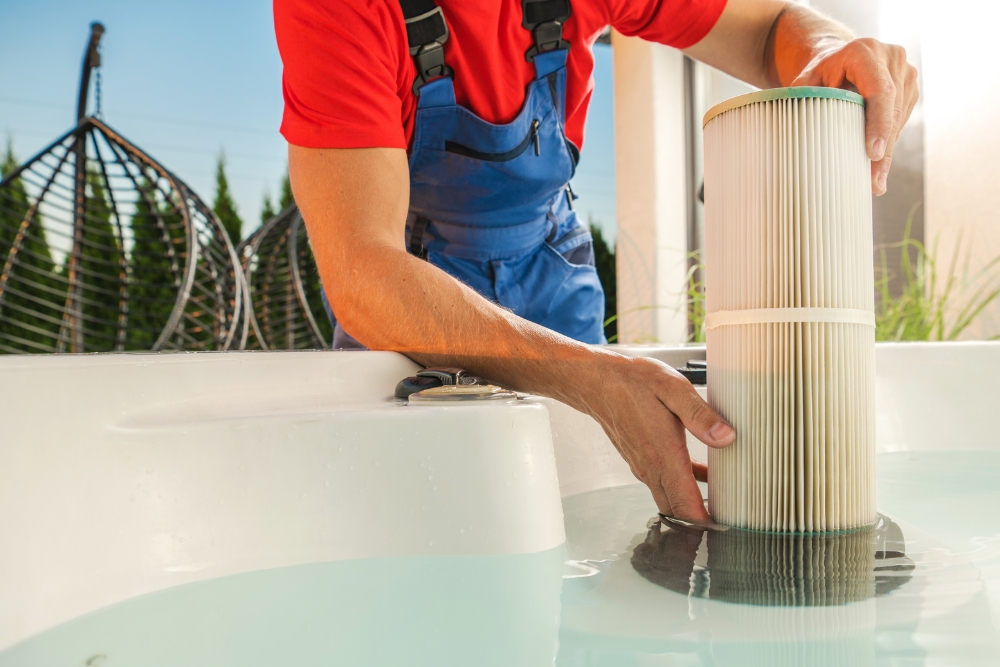
Understanding How Hot Water Heaters Work
Hot water heaters work by heating either electrically or with gas to warm the water in the tank. The heated water is then distributed when a tap is turned on.
Electric heaters
Electric heaters in our hot water systems can sometimes face overheating issues, leading to discomfort and safety concerns. Overheating often results from a thermostat set too high or a malfunctioning component within the system.
We need to keep an eye out for signs like scalding water or unusual noises, which suggest it’s time to take action.
To resolve the electric water heater overheating, we start by adjusting the thermostat settings. It’s crucial not just for preventing burns but also for extending the lifespan of our heating element and tank.
In cases where adjusting the temperature doesn’t fix the issue, troubleshooting might involve checking for sediment build-up or ensuring there is no restriction in cold water inlet valves.
Regular maintenance and proper care are key steps we embrace to avoid running into these challenges with our electric heaters.
Gas heaters
Gas heaters, which are commonly found in many homes, can also experience overheating issues. This can be caused by a high thermostat setting or a malfunctioning temperature control valve.
If the water is too hot for normal use, it could lead to scalding injuries and potential damage to the hot water system. It’s important to regularly check and maintain gas heaters to prevent these issues from occurring.
One way to address this problem is by adjusting the thermostat on the gas heater to a lower temperature. Additionally, having a professional inspect and clean the heating element can help ensure that the system operates at an appropriate temperature without overheating.
Regular maintenance of gas heaters is crucial in preventing overheating problems and ensuring a safe and reliable hot water supply for your home.
Common Causes of Hot Water Service Overheating
Hot water service overheating can be caused by a temperature setting that is too high, a malfunctioning thermostat, high mineral content in the water, or a blocked pressure relief valve.
These issues can lead to excessively hot water and potential damage to the system if not addressed promptly.
Temperature setting too high
If the temperature setting on your hot water system is too high, it can lead to scalding and put additional strain on the unit. Lowering the thermostat setting can help prevent overheating and reduce the risk of burns from excessively hot water.
Regularly checking and adjusting the temperature setting within safe limits is crucial for maintaining a comfortable and safe hot water supply in your home.
To prevent potential scalding or damage to your system, it’s important to ensure that the temperature setting is not too high, protecting both your family and your hot water service.
Malfunctioning thermostat
A malfunctioning thermostat can cause your hot water system to overheat, leading to scalding water and potential damage. Signs of a faulty thermostat include inconsistent water temperature or the water being excessively hot.
If you suspect a problem with the thermostat, it’s important to address it promptly to avoid unsafe conditions.
Regular maintenance and checking for any issues with the thermostat are crucial in preventing overheating problems. Adjusting the thermostat settings and ensuring they are functioning correctly will help maintain safe and comfortable hot water temperatures in your home.
High mineral content in water
High mineral content in water can contribute to hot water service overheating. The presence of minerals like calcium and magnesium can lead to sediment buildup, causing the heating element to work harder and potentially overheat.
This buildup can also reduce the efficiency of the heater, leading to decreased performance and higher energy consumption.
Regular maintenance is essential for addressing high mineral content in water. Flushing the tank periodically can help remove sediment and prevent overheating issues. Additionally, installing a water softener or using descaling agents may be necessary to minimise mineral accumulation in the system.
Understanding how high mineral content affects your hot water system is crucial for preventing overheating problems and maintaining efficient operation. It’s important to address this issue promptly to ensure the optimal performance of your hot water service.
Blocked pressure relief valve
If your hot water service is overheating, a blocked pressure relief valve might be to blame. This can lead to excessive pressure buildup within the tank, causing it to overheat and potentially pose a danger.
Regular maintenance and checking for blockages in the relief valve can prevent overheating issues. Neglecting this simple task could result in scalding water, leaks, or even damage to the unit.
Hot water systems may experience a lack of adequate temperature control due to blockages in the pressure relief valve. This issue must be addressed promptly by homeowners or professionals for safety and system longevity reasons.
DIY Solutions for Hot Water Service Overheating
Lower the temperature setting, check and clean the thermostat, and flush the tank. Dive into these practical fixes to keep your hot water service running smoothly!
Lowering temperature setting
To prevent your hot water service from overheating, adjust the temperature setting on your thermostat. Locate the temperature dial and turn it down to a safe and comfortable level, typically around 120 degrees Fahrenheit (49 degrees Celsius).
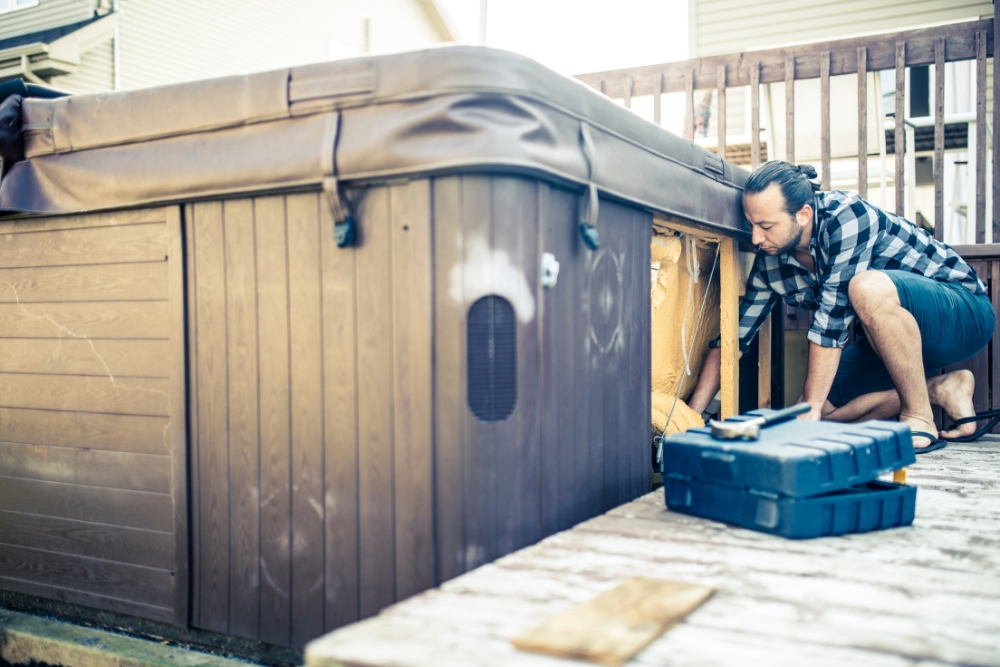
By doing so, you can reduce the risk of scalding while still ensuring an adequate supply of hot water for your household needs. Regularly checking and adjusting the temperature setting is a simple yet effective way to maintain optimal performance and safety for your hot water system.
Keep an eye on the temperature gauge to ensure that it remains within the safe range. Adjusting the thermostat setting minimises energy consumption as well as reduces wear and tear on your hot water system, contributing to its longevity.
Checking and cleaning thermostat
To ensure a properly functioning hot water system, we recommend regularly checking and cleaning the thermostat. Dust and debris can accumulate over time, affecting the accuracy of the temperature reading.
With a soft brush or cloth, gently remove any build-up from the surface of the thermostat. Additionally, make sure to check for any loose wiring or corrosion that may interfere with its function.
By keeping the thermostat clean and well-maintained, you can help prevent overheating issues and ensure your hot water service operates efficiently.
Regularly inspecting and cleaning the thermostat is essential for maintaining optimal performance in your hot water system. Over time, dust accumulation can affect its accuracy, leading to potential overheating problems.
Flushing the tank
After checking and cleaning the thermostat, another DIY solution for addressing hot water service overheating is flushing the tank. Sediment buildup in the tank can lead to overheating issues by insulating the heating element or burner, causing it to work harder and overheat.
To flush the tank, turn off the power supply to the water heater. Next, connect a garden hose to the drain valve at the bottom of the tank and run it outside or into a drain. Open a hot water faucet in your home and then open the drain valve to allow water from inside of your heater to flow out through the hose.
Carefully monitor this process as sediment-laden water drains from your unit; when clear water flows through you can close up everything – turning off first your tap then closing up your valve followed by disconnecting your hose being careful no splashes get on you before turning back on power safely once more avoiding any overheating taking place within it due enough getting air will ensure maximum performance reducing any extra energy usage sparing your pocket too!
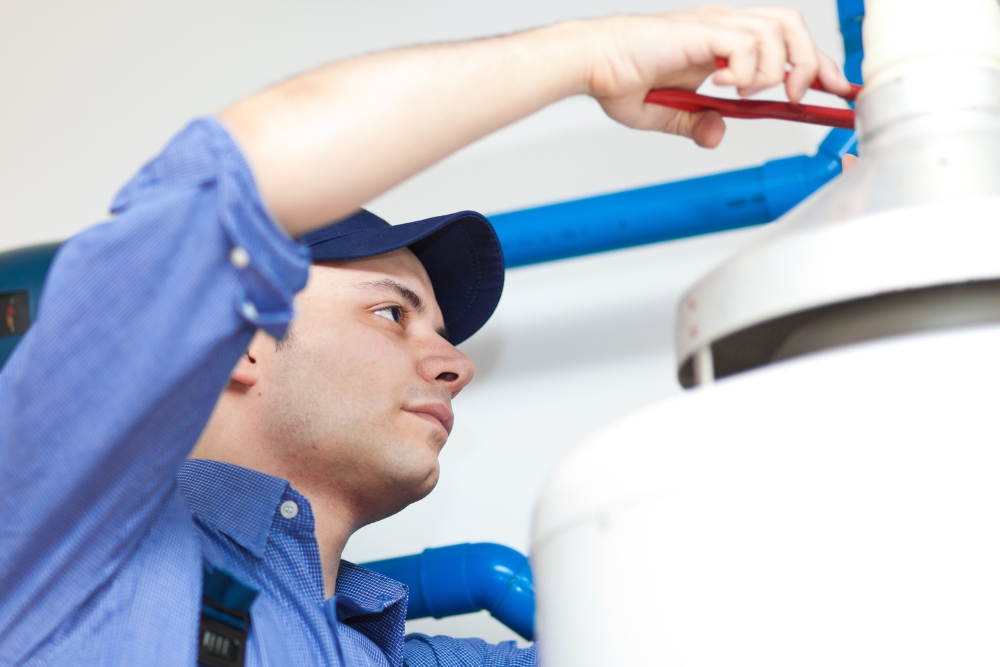
Professional Hot Water Service Repairs
When addressing hot water service issues, it’s essential to consider professional repairs. Choosing the right professional and regular maintenance are crucial aspects of ensuring a safe and efficient hot water system.
Choosing the right professional
When seeking a professional for hot water service repairs, it is essential to find a licensed and experienced plumber or technician. Look for professionals with expertise in fixing overheating issues specifically related to your type of water heater, whether it’s electric, gas, or tankless.
Ensure that the chosen professional has a track record of resolving hot water system malfunctions effectively and safely.
Conduct thorough research by checking reviews, asking for recommendations from friends or family, and requesting quotes from multiple professionals before making a decision. Remember that prompt attention to overheating problems can prevent scalding and potential damage to the unit.
Regular maintenance by the right professional can help prevent future overheating issues with your hot water system.
Importance of regular maintenance
Regular maintenance is crucial for preventing hot water service overheating problems. Checking the thermostat setting, testing the pressure relief valve, and flushing the tank are vital tasks that should be carried out periodically to ensure the efficient operation of your system.
Over time, sediment buildup can occur in the tank, compromising its functionality. Therefore, scheduling routine maintenance with a professional will help keep your hot water system running smoothly and prevent potential hazards such as scalding water or damage to the unit.
Neglecting regular maintenance can lead to more serious issues over time. By staying on top of necessary upkeep tasks like inspecting for leaks and ensuring proper ventilation, you can avoid costly repairs and extend the lifespan of your hot water system.
Potential dangers of ignoring the issue
Regular maintenance and proper adjustments to the thermostat can help prevent overheating problems with hot water systems. Ignoring these issues can lead to scalding accidents, as well as potential damage to the unit if left unattended.
Furthermore, continued overheating may result in increased energy consumption and higher utility bills due to inefficiencies in the system. It’s essential for homeowners to address any signs of overheating promptly to ensure the safety of their household and avoid costly repairs or replacements down the line.
Ignoring an overheating hot water service can also result in long-term damage to the internal components of the system, potentially leading to more extensive and expensive repairs later on.
Same-Day Comfort with Our Hot Water Repair Services!
Preventing hot water service overheating issues is crucial for the safety and efficiency of your system. Adjusting thermostat settings, cleaning components, and conducting regular maintenance are essential tasks for homeowners.
Promptly addressing any signs of malfunction can help avoid scalding incidents and costly repairs or replacements.
Is your hot water service overheating, causing discomfort and potential safety hazards? Don’t wait until it’s too late! At Hot Water Repairs Today, we specialise in diagnosing and fixing overheating issues promptly.
Our experienced technicians will assess your hot water system, identify the root cause of overheating, and implement effective solutions to restore optimal performance. Don’t let overheating disrupt your daily routine or put your property at risk.
Contact Hot Water Repairs Today for professional assistance in resolving your hot water service overheating problems. Trust us to keep your hot water system running safely and efficiently!



